
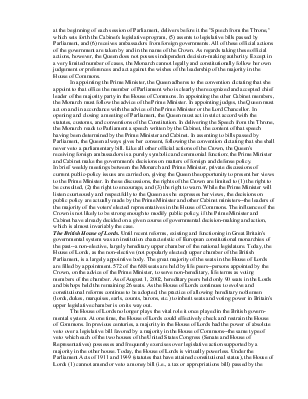
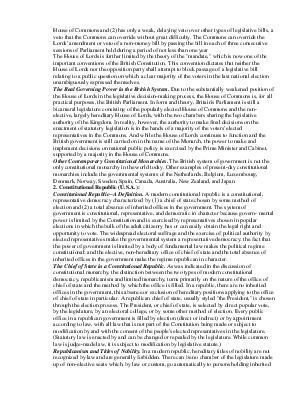
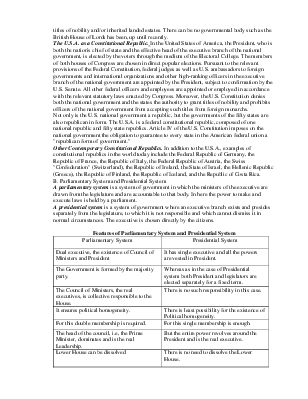
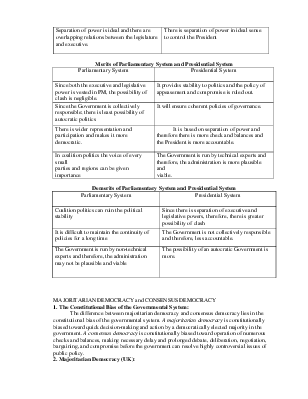
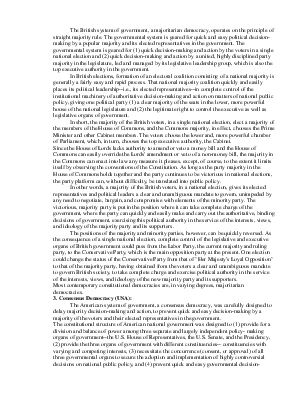
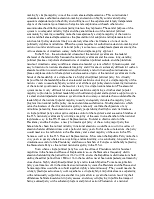
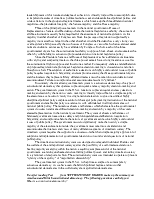

TEXT 12
British and American Constitutional Democracy
Modern constitutional democracies can be classified within the framework of three typologies, each of which consists of two contrasting categories of constitutional democratic political regimes -- (1) constitutional monarchy and constitutional republic, (2) parliamentary system and presidential system, and (3) majoritarian democracy and consensus democracy. In the case of each typology, the American system of government falls into one category, and the British system falls into the other category. Great Britain is a constitutional monarchy, while the U.S.A. is a constitutional republic. A parliamentary system operates in Britain, and a presidential system operates in the U.S.A. The British governmental system is a majoritarian democracy, whereas the American system is a consensus democracy.
CONSTITUTIONAL MONARCHY and CONSTITUTIONAL REPUBLIC
1. Constitutional Monarchy (U.K.):
Constitutional Monarchy--A Definition. In a modern constitutional monarchy, or limited monarchy, the government is carried on in the name of one person who inherits his or her title and office but whose political authority is limited by law. The government, though carried on in the name of a hereditary chief of state, is genuinely constitutional, representative, and democratic in character. The authority of the Monarch is strictly limited by the Constitution. The real powers of government are solely or primarily in the hands of the people's elected representatives, especially those who are members of the majority party or coalition in the lower house of the legislature. The Monarch either shares political authority with the elected representatives and their leadership or, as is the case in Great Britain, has virtually no real authority and is a mere figurehead ruler, a purely symbolic and ceremonial sovereign.
A Constitutional Monarch as Chief of State. Whether a particular constitutional, representative democracy is a constitutional monarchy or a constitutional republic turns primarily on the nature of the office of chief of state and the method by which that office is filled. The chief of state, in either a republic or limited monarchy, is the ceremonial leader of the entire political society and sovereign state, the symbol of national unity and patriotism. In a constitutional monarchy, the chief of state is an hereditary monarch in whose name the government is carried on. The office of Monarch (King or Queen, Emperor or Empress) is held by the head of the dynasty accepted by the political society or nation as its legitimate royal family. When the reigning Monarch dies or abdicates, the office and title of Monarch are inherited by the member of the royal family who is next in the line of succession.
Governing Power in a Constitutional Monarchy. The Monarch is not an absolute monarch. Political authority is not lodged solely or primarily in the Crown. Real governing power is held and exercised by the voters' elected representatives. A modern constitutional monarchy, as we have seen, is representative and democratic as well as constitutional.
The Role and Authority of the British Monarch. In the United Kingdom of Great Britain and Northern Ireland, every aspect of the Kingdom's government is carried on in the name of the Queen. The Prime Minister and Cabinet are referred to as "Her Majesty's Government" and as the "Ministers of the Crown." The Prime Minister has been called "Her Majesty's Chief Minister" and the "Chief Minister of the Crown." Britain's military forces are referred to as "Her Majesty's Armed Forces," different branches of the military service labeled respectively the Royal Air Force," the "Royal Navy," and the "Royal Marines." (The Army is referred to as the "British Army.") Each ship in the Royal Navy is called "Her Majesty's Ship," or "HMS." The British courts are referred to as the "Royal Courts," and each prosecutor is officially known as the "Crown's Attorney."
The Queen symbolically and ceremoniously wields governmental power in Great Britain. For example, she (1) appoints the Prime Minister and the other Cabinet ministers, (2) appoints judges to fill vacancies on the Royal Courts, (3) opens and closes the annual meetings of Parliament, (4) at the beginning of each session of Parliament, delivers before it the "Speech from the Throne," which sets forth the Cabinet's legislative program, (5) assents to legislative bills passed by Parliament, and (6) receives ambassadors from foreign governments. All of these official actions of the government are taken
Уважаемый посетитель!
Чтобы распечатать файл, скачайте его (в формате Word).
Ссылка на скачивание - внизу страницы.